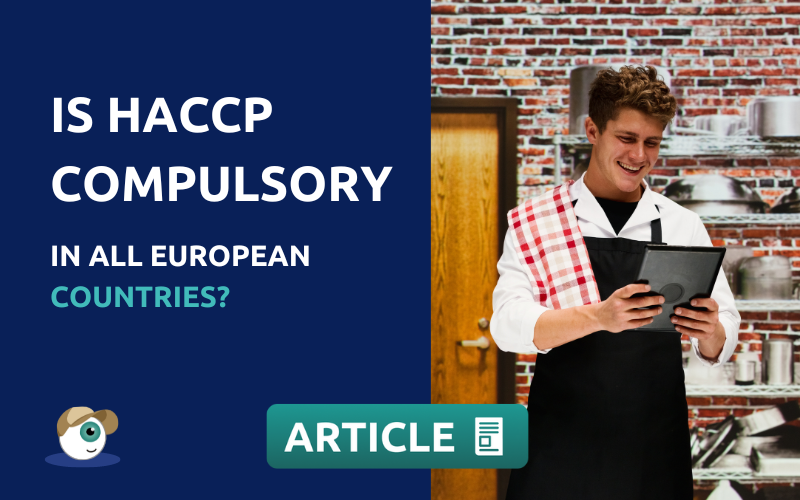Is HACCP compulsory in all European countries?

If you own or manage a hospitality and/or food service business, you are already familiar with Hazard Analysis and Critical Control Points (HACCP), a systematic approach to food safety management that aims to prevent, reduce, or eliminate potential hazards in the food production process.
Widely recognised and implemented, HACCP is a critical tool to ensure the safety and quality of the food we consume.
However, is HACCP compulsory in all European countries?
The answer, in this article.
HACCP: A Brief Overview
HACCP involves identifying potential hazards in the food production process and implementing control measures at critical points to ensure food safety.
The approach is based on seven principles that guide the development and implementation of a robust food safety management system.
These principles encompass hazard analysis, critical control point identification, critical limits establishment, monitoring procedures, corrective actions, verification, and record-keeping.
You can find out more about the seven HACCP principles and the HACCP Matrix here.
HACCP in European legislation
While HACCP’s principles are globally recognised and endorsed by international bodies like the World Health Organization (WHO) and the Food and Agriculture Organization (FAO), its enforcement as a mandatory requirement varies across European countries.
The European Union (EU) has established regulations that set the foundation for food safety standards, but the implementation specifics can differ between member states.
The EU has incorporated HACCP principles into its overarching food safety framework through the General Food Law Regulation (EC) No 178/2002. This regulation lays down the general principles and requirements of food law, including the need for a science-based approach to food safety.
However, the exact requirements for HACCP implementation can vary from country to country within the EU.
So, the answer to the question “Is HACCP compulsory in all European countries” is NO.
National authorities of member states often set specific guidelines and regulations, which may include mandatory HACCP implementation for certain food sectors, such as meat processing, dairy production, and seafood handling.
HACCP Normative – National Variations
In some European countries, HACCP implementation is compulsory for all food businesses, while in others, it may be mandatory only for specific sectors or business sizes.
National food safety agencies oversee the implementation of HACCP and ensure compliance with their respective regulations.
For example, countries like the United Kingdom, France, and Germany have well-established systems for HACCP implementation, including training, inspections, and enforcement.
On the other hand, smaller or less developed nations may have different timelines and priorities for enforcing HACCP requirements.
HACCP: The Swedish Case
The Swedish equivalent of HACCP is called “Egenkontrollprogram” or “Egenkontroll i livsmedelsverksamhet.” It translates to “Self-control program” or “Self-control in food operations.”
To achieve the Egenkontrollprogram, businesses in the food sector must comply with the regulations set by the Swedish Food Agency (Livsmedelsverket). The main requirements include:
- Hazard Analysis: Businesses must identify and assess potential hazards related to food safety, such as biological, chemical, and physical hazards.
- Critical Control Points (CCPs): Critical control points are identified, where measures are implemented to control or eliminate identified hazards. Monitoring procedures are established to ensure CCPs are effectively controlled.
- Procedures and Records: Detailed procedures for handling, storage, processing, and distribution of food must be documented. Records of activities, inspections, and corrective actions must be maintained.
- Training and Education: Staff members involved in food handling must receive appropriate training and education on food safety and hygiene practices.
- Traceability: Businesses must establish systems to trace and track the origin, handling, and distribution of food products to facilitate product recall if necessary.
- Regular Audits and Inspections: Periodic inspections and audits are conducted by the local authorities to ensure compliance with the regulations.
However, many food establishments voluntarily implement HACCP principles to ensure food safety.
HACCP certification in Sweden is a third-party verification process that confirms that a company’s food safety management system is effective and meets international standards.
Once the HACCP Certification in Sweden plan is in place, the company must undergo an audit by an accredited third-party certification body to assess its compliance with the HACCP principles and international standards.
If the audit is successful, the company will be awarded HACCP certification in Sweden.
Embracing Food Safety as a Culture
Whether HACCP is compulsory or not, the landscape of food safety is changing across the globe.
While regulations and requirements may vary from country to country, one common thread unites food businesses worldwide: the growing awareness of the need for a strong food safety culture.
Businesses are recognising that implementing robust food safety practices is not just about meeting regulatory obligations; it’s about protecting consumer health, ensuring product quality, and maintaining their reputation in the long term. The shift is towards seeing food safety not as a box to check, but as an integral part of business operations that drives customer trust and loyalty.
In this evolving food safety landscape, digital food safety software like Andy are becoming the norm everywhere.
Thousands of food brands everywhere are choosing to digitise their HACCP registries and processes with Andy, streamlining operations, minimising errors, and increasing efficiency.
By embracing technology, businesses can focus more on what truly matters: delivering safe, high-quality food to their customers.
Try Andy App now and discover the many benefits of having this helpful Food Safety digital assistant helping your
restaurants/food service business’ teams!
👉🏽START 100% FREE HERE!👈🏽

